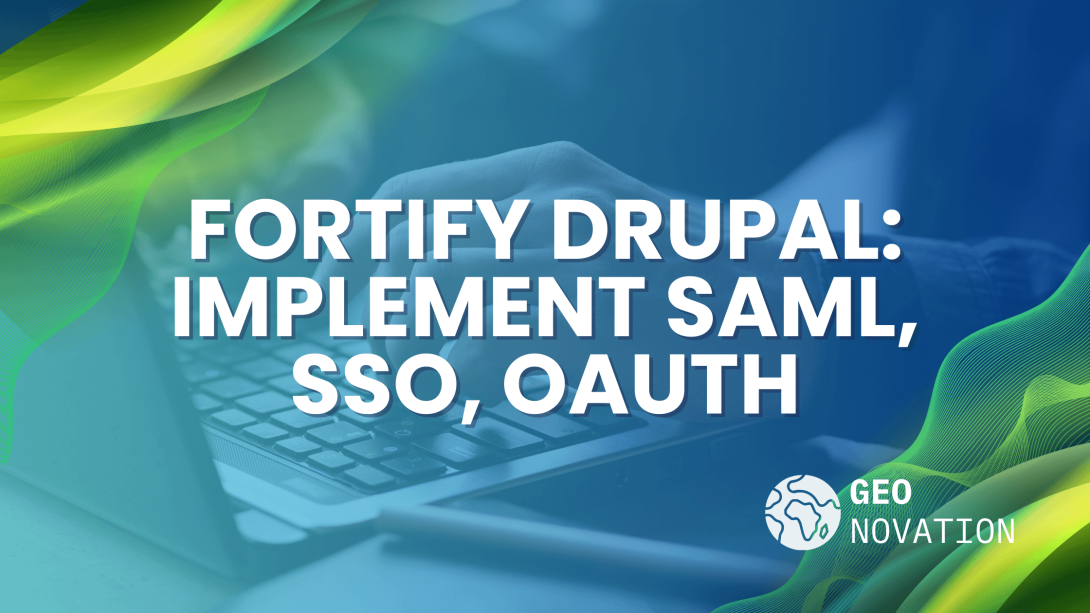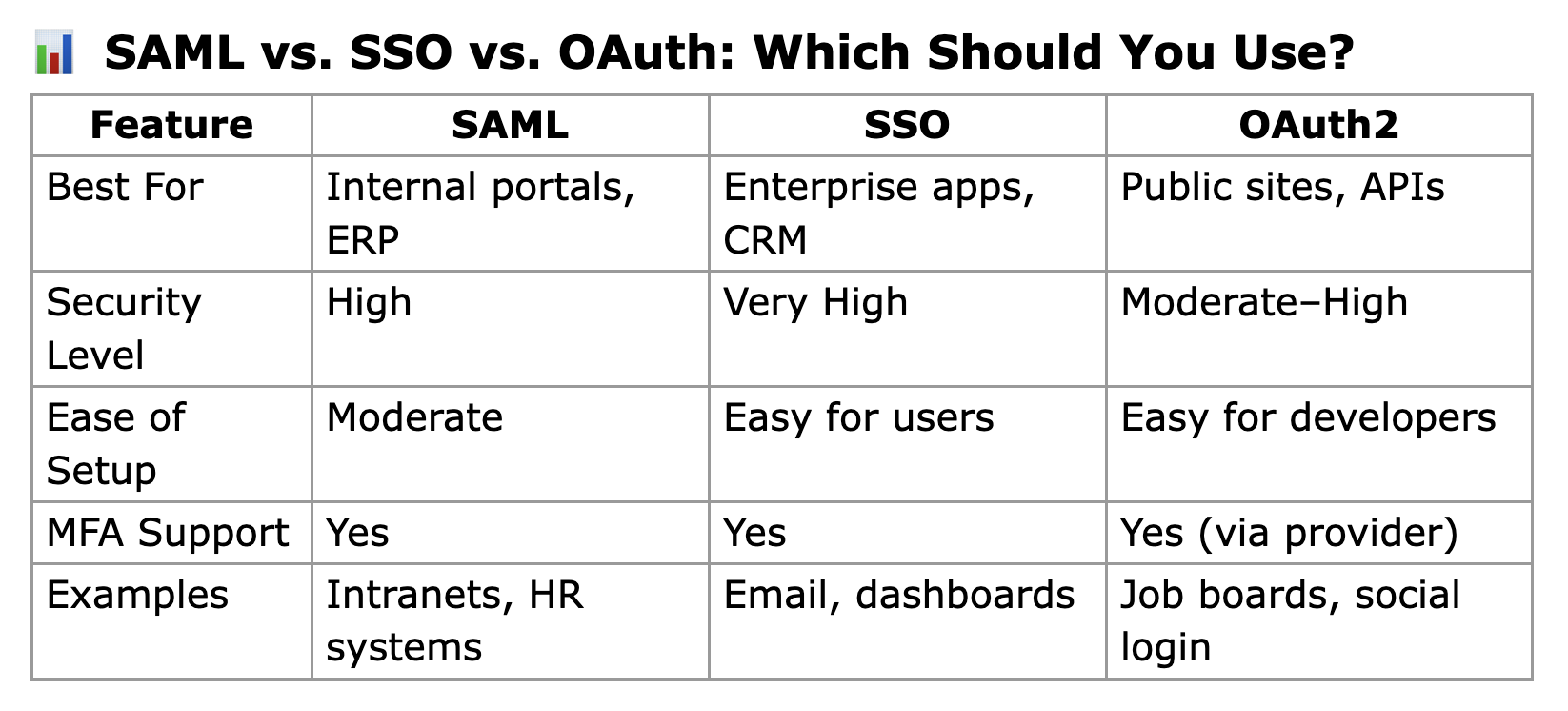- Home
- Boost Your Drupal Security With SAML, SSO & OAuth: A Complete Guide For 2025
Boost Your Drupal Security with SAML, SSO & OAuth: A Complete Guide for 2025

4 April, 2025
Why Drupal Security Matters in 2025
In 2025, cybersecurity threats are more sophisticated and widespread than ever. For enterprise websites powered by Drupal, weak authentication is no longer just a technical issue—it’s a business risk. One breach could lead to lost customer trust, stolen data, and costly regulatory penalties.
To safeguard sensitive information and maintain regulatory compliance (GDPR, HIPAA, CCPA), corporate websites must implement enterprise-grade authentication protocols. That’s where SAML, SSO, and OAuth2 come in.
In this guide, you’ll learn:
- What SAML, SSO, and OAuth are
- How they work in the Drupal ecosystem
- Which protocol is best for your organization
- How to implement each one using Drupal modules
The Importance of Secure Authentication in Drupal Websites
Drupal websites are more than content management systems—they power employee portals, client dashboards, enterprise applications, and B2B platforms.
These systems often handle:
- HR data
- Financial records
- Internal communications
- API integrations
With rising threats like phishing, credential stuffing, and session hijacking, password-only authentication is outdated. Strong identity management is now a core security requirement.
What Are SAML, SSO, and OAuth?
Let’s break down the three most common authentication methods used in Drupal for 2025:
1. SAML (Security Assertion Markup Language)
SAML is an XML-based protocol used for federated identity management. It allows users to log in once and access multiple services—perfect for internal corporate systems.
How SAML Works in Drupal:
- User requests access to Drupal.
- Drupal redirects them to a SAML Identity Provider (IdP), such as Okta or Microsoft Entra ID.
- The IdP verifies the user and sends a SAML token back.
- Drupal grants access based on the verified identity.
🌟 Key Benefits of SAML:
- Centralized login for enterprise users
- No password stored in Drupal
- Compliant with ISO 27001, NIST, GDPR
- Ideal for internal portals and secure intranets
🔧 Drupal Module:
- Use SimpleSAMLphp Authentication
2. SSO (Single Sign-On)
SSO enables users to sign in once and gain access to multiple applications, streamlining workflows across your tech stack.
✅ How SSO Works in Drupal:
- User authenticates via a centralized system (e.g., Google Workspace, Azure AD).
- The session is shared across apps.
- Drupal recognizes the login and grants access without a second prompt.
🌟 Why Use SSO:
- Seamless user experience
- Reduces login fatigue
- Enforces MFA at the identity provider level
- Boosts productivity
🔧 Drupal Module:
- Use SSO Integration with appropriate identity providers
3. OAuth2 (Open Authorization)
OAuth2 is the industry standard for delegated access—ideal for public-facing websites, mobile apps, and third-party integrations.
✅ How OAuth Works in Drupal:
- User chooses to sign in using a service (e.g., Google, LinkedIn).
- Drupal redirects to the OAuth provider.
- User authorizes access.
- OAuth provider returns a secure token.
- Drupal uses the token to authenticate the session.
🌟 Advantages of OAuth:
- No credentials stored in Drupal
- Token-based access = more security
- Supports granular permissions
- Ideal for login with social media or external services
🔧 Drupal Module:
Use OAuth2 Server or Social Auth

Pro tip:
- Use SAML or SSO for employee-facing apps.
- Use OAuth2 for public-facing platforms or external user integrations.
How to Implement SAML, SSO, or OAuth in Drupal
Before proceeding with the setup, you’ll need an Identity Provider (IdP) such as Okta, Entra ID, or OneLogin.
There are both paid and free solutions for implementing these authentication methods in Drupal.
Paid Solution: Miniorange Module
✅ Pros:
- Quick and easy integration with standard identity solutions
- Includes support and assistance from the module provider
❌ Cons:
- High cost compared to open-source alternatives
- No code customization—the license prohibits modifications as the code is obfuscated
Free Solutions
For those looking for open-source alternatives, here are some free Drupal modules that can be used:
- Implements the OIDC protocol (a part of OAuth 2) to manage identity.
- May have role-mapping issues with certain OAuth implementations (e.g., Azure) but can be patched.
- Implements the full OAuth 2.0 protocol inside Drupal.
- Works with all OAuth 2.0 Server providers.
- Implements SAML authentication in Drupal.
- Serves as a Drupal wrapper for the SimpleSAMLphp library.
Important Considerations
Regardless of the solution you choose, you’ll need to configure OAuth or SAML server credentials, including the necessary keys and authentication details. This configuration can sometimes be complex.
One critical security aspect to consider is where to store these credentials, as they contain sensitive information. To manage this securely, you can use:
🔗 Config Split – Helps separate and manage configuration securely.
Why Secure Authentication Is Critical in 2025
Staying ahead of cybersecurity threats in 2025 means implementing strong, flexible, and scalable authentication systems.
Key trends driving this shift:
- New regulations like the EU Digital Services Act (DSA)
- SEC mandates on breach disclosure timelines
- Remote and hybrid work environments require SSO
- Growing expectations for frictionless UX + airtight security
Future-Proof Your Drupal Security
Drupal is a powerful platform, but it’s only as secure as your authentication system. Whether you manage a large corporation or a fast-growing SaaS platform, choosing the right login strategy is critical.
Recommendations:
- Use SAML or SSO for internal users
- Use OAuth2 for external users and integrations
- Always enforce multi-factor authentication (MFA)
- Audit and update authentication settings regularly
Need Help Securing Your Drupal Site?
At Geonovation.it, we specialize in securing enterprise Drupal platforms using SAML, SSO, and OAuth. Whether you need a full authentication setup or help integrating with your existing identity provider, we’ve got you covered.
📩 CONTACT US TODAY to discuss your project and fortify your Drupal website with enterprise-level authentication.